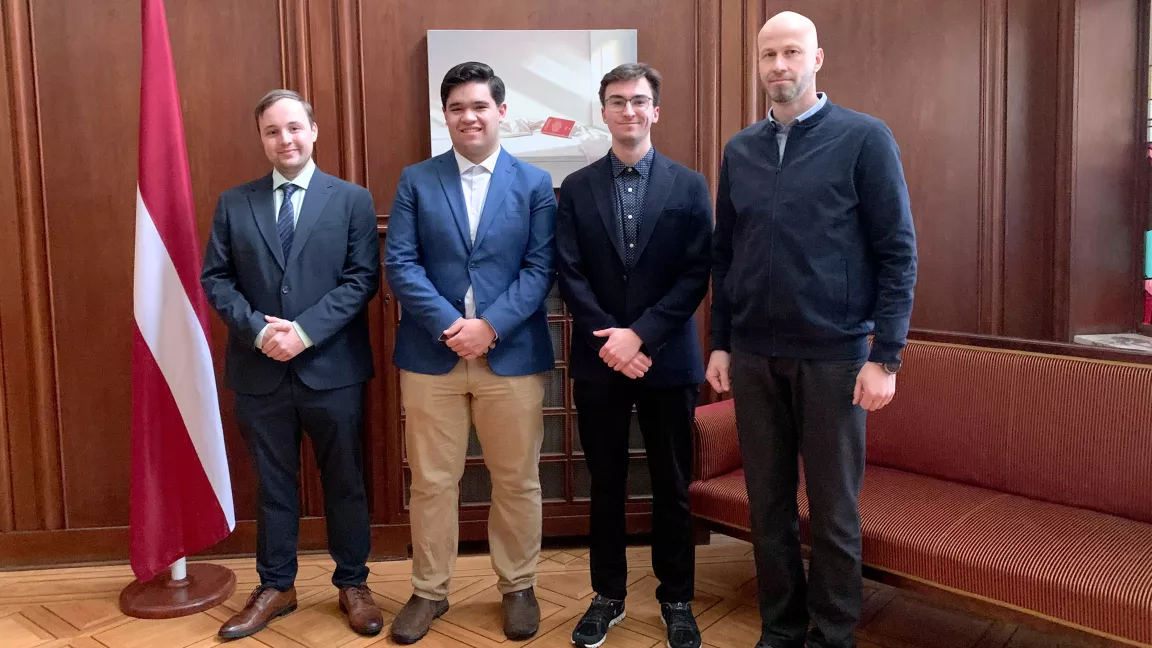Learning diplomacy on the fly
UNBC students Sean Robinson and Will Hanlon put their diplomacy skills to the test as delegates at a Model NATO event in Germany last fall.

Imagine a world where Bosnian Serbs announced their intention to secede from Bosnia and Herzegovina and at the same time the Russian government began to sabotage infrastructure in the Baltic Sea. How would the North Atlantic Treaty Organization (NATO) react to such a dynamic and fraught situation?
This was the question UNBC students Sean Robinson and Will Hanlon were faced with when they attended a Model NATO event in Berlin late last year. As an added wrinkle, the two upper-year undergraduate students had to consider the implications from a Latvian perspective.
“It was a great experience and it really demystified what NATO is, how it works and demonstrated the importance of diplomacy and compromise,” Hanlon said. “We had to use problem-solving skills and learn how to negotiate.”
University students from 17 countries attended the four-day simulation. They were each assigned a NATO country to represent and placed on one of three committees: the military committee, the public diplomacy committee or the North Atlantic Council. Both Robinson and Hanlon were assigned to Latvia along with a German student, with Robinson serving on public diplomacy and Hanlon on military.
The pair were given the main scenario, centered around the possible break up of Bosnia and Herzegovina, prior to departing for Berlin and they spent weeks working with their German counterpart putting together a country report. Once in Germany, they visited the Latvian embassy and met with a defence attaché and discussed the scenario.
“I was nervous about what we had prepared at first,” Robinson said. “But speaking with the defence attaché gave us some clarity on policy and he gave some great advice on how to be diplomatic.”
During the simulation the pair found themselves working with delegates representing other Baltic and Nordic countries including Lithuania, Estonia and Finland. There was a Canadian delegation at the conference, but they were represented by a trio of Norwegian students.
The background research Robinson and Hanlon did in advance was helpful as the scenario included some twists, testing the delegates’ ability to think on their feet.
“One moment I was about to propose an amendment to what we were discussing and then I was handed a note instructing me to redirect the conversation to another topic,” Hanlon said.
The objective of the exercise was to get all delegates on the North Atlantic Council to agree on a course of action. The military and public diplomacy committees were tasked with providing reports that made up part of the final document.
It wasn’t easy.
“There were some stressful moments in the simulation,” Robinson said, recalling that near the end of the exercise a disagreement almost resulted in the final report not being ratified by the full North Atlantic Council. “You could feel the tension in the room.”
In addition to the simulation, the delegates also heard from keynote speakers including a German government representative on the real NATO as well as the president of the Federal Academy of Security Policy in Berlin where the conference was held.
“Canada is a member of NATO, and hearing from people involved gave me more insight on how our system of government operates in international contexts,” Robinson says. “Attending the Model NATO event gave me greater respect for our process of governance.”
The trip also gave them the chance to explore Berlin and learn more about German history and culture.
Both Robinson and Hanlon are grateful for the support they received from UNBC to help them attend the Model NATO event and are thankful to History Professor Dr. Jaqueline Holler who suggested they submit an application to attend.
“Many of the other delegates wanted to hear more about northern British Columbia and we told them all about UNBC,” Robinson said.
“And a lot of them were impressed with how UNBC supported us,” Hanlon added.